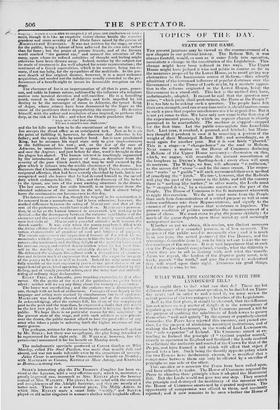TOPICS OF k DAY.
STATE OF THE GAME.
THE present juncture may be viewed as the commencement of a new chapter in our political history. The Reform Bill, it was always foretold, would, so soon as it came fairly into operation, necessitate a change in the coestitution of the Legislature. This change might have been induced in two ways. Tlie Upper House might have judeed it wise and politic to concur so far in the measures proposed by the Lower House, as to avoid gi‘ing any obstruction to the harmonious course of Reform,—thus silently admitting of the increased influence of popular doctrines over the Government : or the House of Lords might, by a resolute opposi- tion to the reforms originated in the Lower lIouse, bring the Government to a stand-still. This last is the tnethod they have,. unfortunately, adopted. It cannot be said that the question now arises, " which party shall predominate, the Peers or the People ?" It is too late to lie asking such a question. The people have felt their own strength, and can at any time settle it, slimed matters come. to such a pass that popular interference mu,t be acspealed to. But it is not yet conic to this. We have only now come to the first step of the experimental process, by which an organic change is clearly perceived to be unavoidable. The murhine is slopped—stopped pier the first time. Let the public contemplate this formidable fact. Last year, it creaked, it groaned, and hitched ; but Minis- ters thought it prudent to ease it by removing a portion of the weight of their Municipal Reform Bill ; and accordingly, on it went again for another year. But it is now fairly " planted." This is a stage—a " chaoge-house" on the road to Reform. Next comes a motion in the House of Commons declaring a Reform of the Upper House necessary;—discussion on this, which, we augur, will resemble the ancient consultation of the burghers in 1)YcHE's Spelling-hook : every class will sport its nostrum. The Whigs, we fear, wilt advocate " as the mason did "stone—and for the saute reason. The respec- tive "crafts" or "guilds" will each recommend their own method of remedying the " bitch." We tru-t, however, that the Radicals will Flay the part of the currier in the fable, and tell the country there is " nothing like leather ;" in other words, the Lords must be " strapped (baste" by a vigorous coercion en the part of the People. The House of Commons is the fit instrument wherewith to apply this coercion. We do not want more from the People
than such firm demonstrations of a settled purpose as will at once infuse confidence into their Representatives, and signify to the
enemies of the popular cause that resistance is hopeless. The present condition of politics resembles the commencement of a game of chess. We must strive to play the pawns skilfully : fur much of the game depends upon these initiatory and seemingly Unimportant moves. Whether or nut we obtain, this session, any distinct measures in fulthciance of a lemedial 'tweet:, is of lees moment. The progress of the public miad is necessarily show : and it is much if, in oae year, the actual vesture of the two Houses, and the reasonings deducible from it, can be fairly set out bellire the un- derstandings of the masses. It is of vast importance that at each step the People should comi.rehewl, clearly, what the difficulty is which they ate to aid iu dealing with, and what the-remedy. A pin we repeat, the leaders of the Popular party must, next week, preach "the truth," and give the country to understand they will stand upon their right. Divisions are good things, but doetrine is even better.


























 Previous page
Previous page